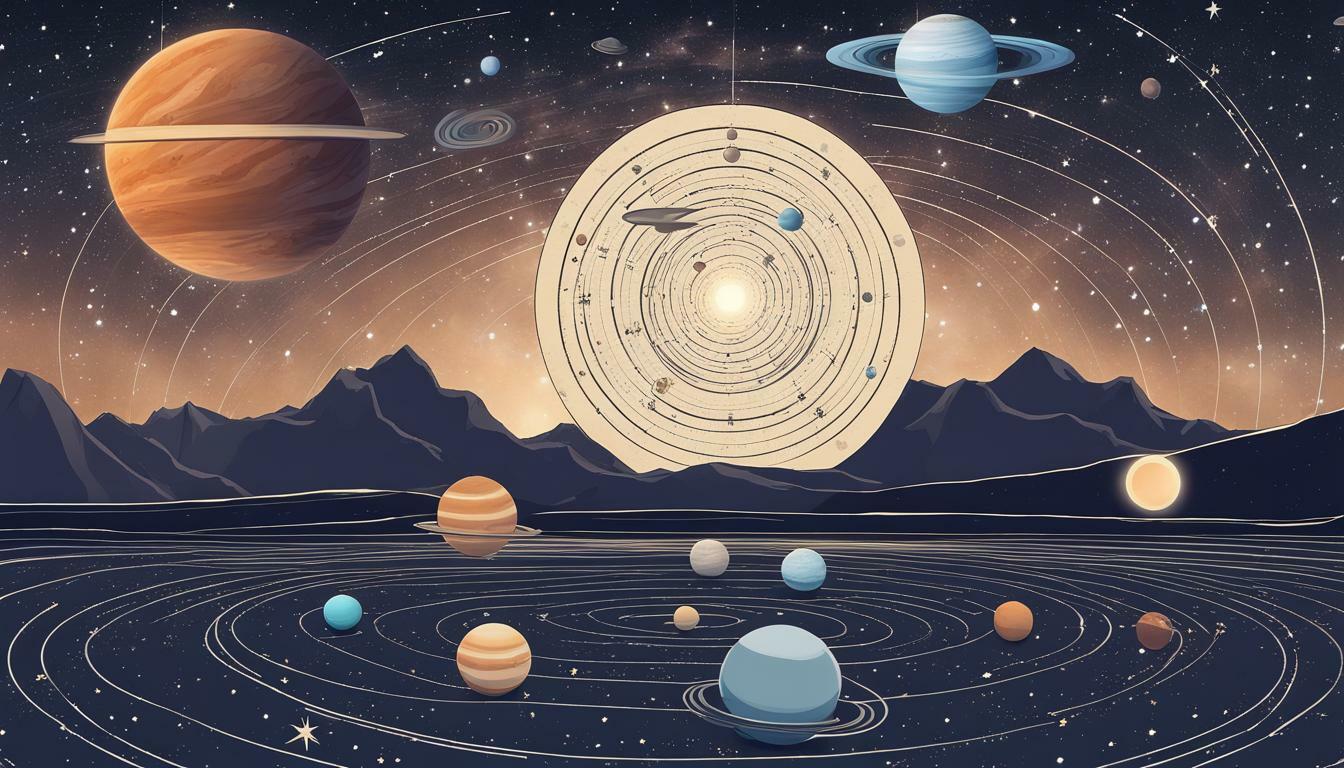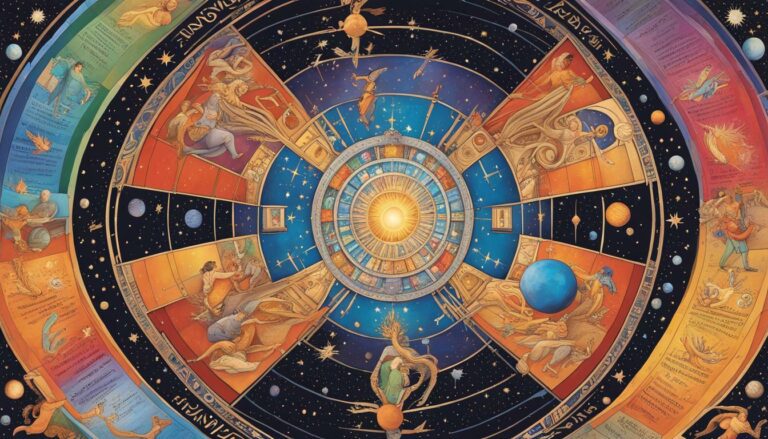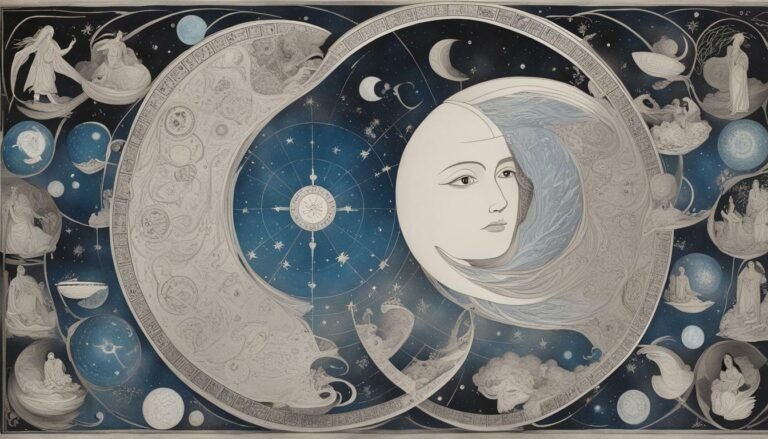Understanding What Aspects Mean in Astrology: Your Guide
Have you ever wondered how astrologers interpret the positions of the planets and stars to reveal insights into your life path and personality? One important aspect of astrology is the connections formed between celestial bodies, known as aspects.
Aspects refer to the angles formed between planets and points in a birth chart, highlighting the relationships between these celestial bodies. These relationships can influence your personality traits, behaviors, and life events, providing a roadmap for self-discovery and personal growth.
Key Takeaways:
- Aspects are angles formed between planets and points in a birth chart.
- Aspects can influence personality traits, behaviors, and life events.
- Understanding aspects is essential for interpreting astrological charts.
Significance of Aspects in Astrology
Aspects play a vital role in unlocking the power of astrology and understanding how celestial bodies influence our lives. These angles between planets and points in a birth chart reveal complex relationships that affect our personality traits, behaviors, and life events. The significance of aspects in astrology cannot be overstated, as they serve as a roadmap to understanding ourselves and our paths in life.
Without a thorough understanding of aspects, astrological readings would be incomplete and inaccurate. Aspects reveal the energy between celestial bodies and how these energies manifest in our lives. Whether you’re new to astrology or a seasoned veteran, understanding the significance of aspects is an essential foundation for building a complete and accurate interpretation of your birth chart.
“Aspects are the building blocks of astrology, revealing the complex relationships between celestial bodies and unlocking the secrets of our lives.”
The importance of aspects lies in their ability to reveal the intricate relationships between celestial bodies and how these relationships shape our lives. Astrologers analyze the angles between planets and points in a birth chart to understand their symbolism and traditional meanings. Through this analysis, astrologers can gain insight into an individual’s personality, potential strengths, challenges, and opportunities. Aspects provide a framework for interpreting the complexities of astrological charts and offer a pathway to greater self-understanding.
The significance of aspects in astrology cannot be overstated. They are the foundation upon which astrological charts are interpreted and analyzed. By understanding the importance of aspects, you can unlock the power of astrology and gain a deeper understanding of how celestial bodies influence your life and path.
Types of Aspects in Astrology
Aspects are important angles between celestial bodies in a birth chart. Understanding the significance of each aspect is essential for interpreting astrological readings. There are five major types of aspects in astrology: conjunctions, oppositions, trines, squares, and sextiles.
| Aspect Type | Angle | Meaning |
|---|---|---|
| Conjunction | 0° | A conjunction occurs when two planets are in the same position and influence each other’s energies. This aspect signifies intensity and focus in a particular area of life. |
| Opposition | 180° | An opposition forms when two planets are opposite each other and have conflicting energies. This aspect signifies challenges and a need for balance in the area of life represented by the planets. |
| Trine | 120° | A trine indicates harmony and ease between two planets, creating a flow of positive energy. This aspect signifies potential talents and a natural alignment in the area of life represented by the planets. |
| Square | 90° | A square forms when two planets have tension and conflicting energies, causing a struggle or crisis in the area of life represented by the planets. This aspect signifies the need to overcome challenges and develop strength and resilience. |
| Sextile | 60° | A sextile signifies opportunity and potential growth between two planets. This aspect signifies easy flow of energy and potential for positive change in the area of life represented by the planets. |
Each aspect has its own unique meaning and interpretation in an astrological chart. A professional astrologer can help you understand the significance of the aspects in your birth chart and how they may affect your life path.
Understanding Astrology Aspect Interpretation
Aspects in astrology are significant since they highlight the relationships between celestial bodies and how they influence different aspects of life. However, interpreting astrology aspects can be quite complex and requires an understanding of each aspect’s symbolism and traditional meanings.
One way that astrologers interpret aspects is by analyzing the angle between planets and points in a birth chart. The closer the angle is to a perfect geometric shape, the more significant the aspect is considered to be. For example, a conjunction, which occurs when two planets are in the same sign and degree, is considered a potent aspect since it brings the energy of the two planets together.
Another aspect that astrologers often look at is opposition, where two planets are directly opposite each other in the chart. This aspect highlights tensions and struggles between different areas of life that need to be reconciled. A square aspect, where two planets are 90 degrees apart, can bring challenges and obstacles, while a trine aspect, which occurs when planets are 120 degrees apart, indicates ease and flow. Sextiles occur when planets are 60 degrees apart, and they often indicate opportunities for growth and development.
It is essential to remember that each aspect can manifest differently for each individual, depending on the planets and points involved. Some people may experience more positive manifestations of an aspect, while others may struggle with the challenges that it presents. Therefore, an experienced astrologer can help provide context and insight into how each aspect can impact an individual’s life and personality.
Overall, understanding astrology aspect interpretation requires in-depth knowledge and expertise. However, gaining insight into the different aspects and their meanings can help individuals better understand themselves and their life paths.
Conclusion
Now that you have a better understanding of what aspects mean in astrology, you can begin to explore their significance and interpret them more effectively. Remember that astrology is a complex system that requires knowledge and practice, so don’t be afraid to seek guidance from a professional astrologer. By examining your own birth chart and analyzing the relationships between celestial bodies, you can gain valuable insights into your personality, behaviors, and life path.
Aspects play a crucial role in astrology, highlighting the connections between different planets and points and influencing their energies. Understanding the different types of aspects and their interpretation can provide a wealth of information about your chart, offering guidance on potential strengths, challenges, and opportunities.
So, take some time to explore your own chart and learn more about the significance of aspects in astrology. With a deeper understanding of this complex system, you can gain valuable insights into your own life and make informed decisions about the future.
FAQ
Q: What do aspects mean in astrology?
A: Aspects in astrology refer to the angles formed between celestial bodies in a birth chart. They signify the relationships and energy flow between these planets and points, influencing various aspects of an individual’s life and personality.
Q: Why are aspects significant in astrology?
A: Aspects play a crucial role in astrology as they provide valuable insights into a person’s character traits, behaviors, and life events. They help astrologers interpret the influences and patterns within a birth chart, guiding their readings and predictions.
Q: What are the different types of aspects in astrology?
A: There are several types of aspects in astrology, including conjunctions, oppositions, trines, squares, and sextiles. Each aspect represents a specific angle between two or more celestial bodies and carries its own unique energy and symbolism.
Q: How do astrologers interpret astrology aspects?
A: Astrologers interpret astrology aspects by analyzing the angles formed between planets and points in a birth chart. They consider the traditional meanings and symbolism associated with each aspect, as well as their potential manifestations in an individual’s life and personality.
Q: What is the importance of understanding aspects in astrology?
A: Understanding aspects in astrology is essential for gaining deeper insights into your own birth chart and how celestial energies may influence your life. By recognizing the significance of these aspects, you can make informed decisions and embrace the potential opportunities and challenges they present.






